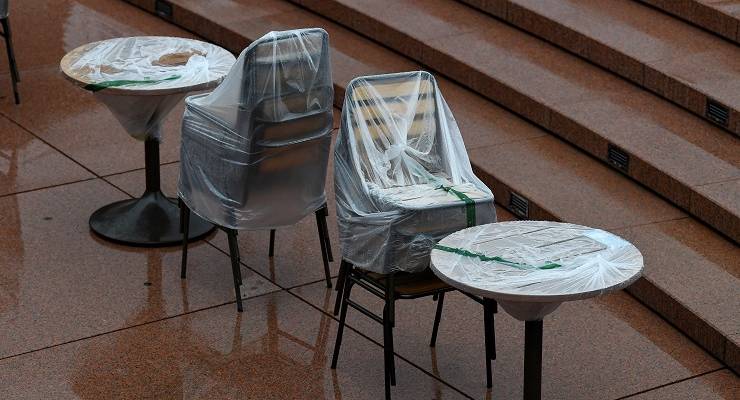
Businesses in NSW and Victoria are likely in for another difficult holiday season as reports of cancelled Christmas gatherings and staff shortages accumulate. Staff who are close contacts or positive cases combined with cautious customers who don’t want to risk infection amount to a grim outlook for hospitality in what could have been a triumphant return to form post-COVID.
In some parts of Europe, Christmas is literally cancelled. Restrictions and lockdowns are back and the WHO chief is recommending cancelling Christmas plans. Meanwhile in Australia, no one’s in lockdown — and yet in some states, the fallout of life with COVID in the community may amount to the same thing.
Even before the return of capacity limits for hospitality in NSW announced yesterday, data from Google suggests that in states where COVID is circulating, retail and hospitality are being avoided (whether by choice or quarantine mandate).
Have we really stopped leaving the house?
Google mobility reports show that NSW and Victoria experienced low numbers of visitors to retail and recreation sites in the six weeks to December 19. Both states saw around a 5% drop in mobility trends to venues such as restaurants and shopping centres when compared to a normal pre-pandemic week in January 2020.
Given the month of December is one of the busiest for retail and hospitality, this trend is concerning, if not surprising. The numbers make sense of reports of businesses closing for isolating staff and people choosing to stay home amid COVID concerns.
The mobility numbers seen in NSW and Victoria are more staggering when compared to the other states and territories, who have all seen more people out and about than during the comparison pre-pandemic week. The ACT, also emerging from an extended lockdown, saw a modest 4% rise in mobility. Meanwhile all the other states and territories saw a 10% or greater increase in visitors to retail and recreation, with WA reporting the largest increase at 25%.
The key difference? The experiences of NSW and Victoria demonstrate the reality of having large numbers of COVID cases in the community. Even now that “living with COVID” is the norm and lockdown is over, the mobility numbers demonstrate that pre-pandemic behaviours will not return while mandatory quarantine looms. These measures may be necessary, but their impact on businesses will be felt keenly at this time of year.
What’s the impact of a homebound Christmas?
Retail will likely be okay given the huge surge in online shopping which saw Roy Morgan and the Australian Retailers Association predict $11 billion in Christmas gift sales. But hospitality is suffering. After two years of lockdowns and forced closures, a lacklustre Christmas period would mark a devastating end to 2021.
While much still remains unknown about the Omicron variant and Australia remains out of lockdown, Council of Small Business Organisations Australia CEO Alexi Boyd said that small business would be feeling the brunt of the uncertainty.
“Community anxiety and confusion can … have a negative effect on small businesses by causing consumers to change their travel and spending habits,” he said.
The 2020-21 Christmas period saw NSW take a $3 billion dollar hit amidst the Northern Beaches and other lockdowns. While this year might not be as bleak, hopes of a return to form have been dashed as the realities of COVID in the community set in.
But it’s not all bad news. Australian Chamber of Commerce and Industry CEO Andrew McKellar told Crikey that the ongoing challenges to businesses include skill and labour shortages, but consumer demand is strong.
“Despite the Omicron variant, the mood amongst businesses remains broadly positive heading into the post-Christmas sales period,” he said.
If businesses can get through the last two years, then there’s likely nothing they can’t overcome.








“…the ongoing challenges to businesses include skill and labour shortages,…” Translation: “We are not going to try to attract local workers by offering liveable wages. F that. We will continue to throw a tantrum until the government restores our pipeline of cheap, exploitable foreign labour. After all, that is why we bought this government, and they need to remember that this is a key plank in taking Australian workers on the race to the bottom.”
Spot on Norm. Christmas eve I had the honor to be invited into the home of an extended Philippine family and their friends. Wonderful hard working people predominately in the areas of cleaning, cooking and aged care.
It appears many arogant white male racists (Including the Member for Manila?) go to Manila (or alternatively Bancock) and bring back Asian spouses. Have several children, break up and return overseas to get another women.
The initial spouse usually ends up on a Permanent Visa and works very hard at bringing up their children often without support of the father. Yes excellent cheap exploited labour.
The Government may have abrogated its role of determining relevant immigration policies leaving them to be be partially determined by randy arrogant white racist males.
The news kinds of skirted over hospitality venues reduced capacity. I wonder how many of them this will send belly up and does Andrews five a flying f… ? I’m feeling irate at the moment. Our local sushi bar in Warragul – you know… country town… in Victoria… in Australia… ie. not Russia… – saw our new pandemic legislation in action recently. Bunch of bully boys from the department of justice who wouldn’t show their entire id badges, had no warrant, eventually accompanied by two local police one of whom pushed the owner – wanted private medical information of staff, read owner her rights, wouldn’t tell her what they thought she’d done wrong. I’m not exaggerating, look up the youtube for yourself and watch it happening. It’s called “a fine country christmas”. This is someone I meet in their shop regularly, so this is fair dinkum. It’s really happening.
Interesting anecdote, if it is true, but ‘one sandwich does not make a picnic’ to justify inaction in these times?
It does not appear to have occurred to the author that many people might prefer to avoid infection in the first place, vaccinated or not. At least, not until the severity risk of omicron is firmly established.
Exactly, the article skirted round reasons why people are avoiding some social events, while looking at Europea where nations release you cannot have a bob both ways e.g. vaccinations as a panacea without other prophylactic measures.